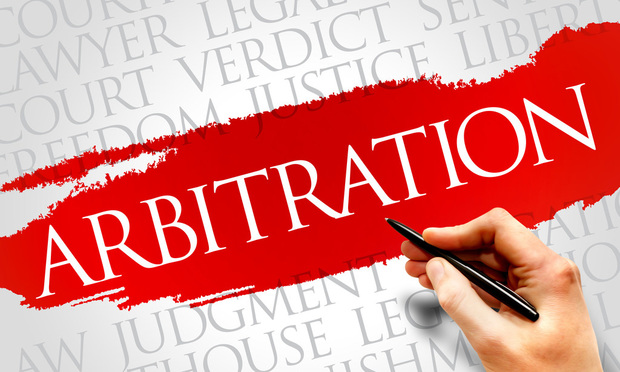Bankruptcy Doesn't Void Arbitration Agreements With Creditors, Federal Judge Rules
U.S. District Judge Harvey Bartle III of the Eastern District of Pennsylvania granted a motion by defendants Citibank, Department Stores National Bank and First Premier Bank that sought to compel arbitration of plaintiff Soldon Winton's Fair Credit Reporting Act lawsuit.
May 01, 2019 at 01:47 PM
3 minute read
 Photo: Shutterstock.com
Photo: Shutterstock.com
A man who sued a credit reporting agency and several banks for listing his accounts as outstanding even after declaring bankruptcy is still bound by arbitration agreements with those creditors, a federal judge has ruled.
U.S. District Judge Harvey Bartle III of the Eastern District of Pennsylvania granted a motion by defendants Citibank, Department Stores National Bank and First Premier Bank that sought to compel arbitration of plaintiff Soldon Winton's Fair Credit Reporting Act lawsuit.
Winton filed for Chapter 7 bankruptcy May 6, 2016, according to Bartle's May 1 opinion. The following November, the court discharged his debts to his creditors.
Winton alleged that a 2018 credit report continued to include outstanding debts to Citibank, DSNB and First Premier without any notation that these debts had been discharged in bankruptcy.
After filing suit, the defendants moved to compel arbitration, citing their agreements with Winton. However, Winton argued that his bankruptcy voided those agreements.
“Winton's position is not supported by the law. A bankruptcy discharge extinguishes only 'the personal liability of the debtor,'” Bartle said, citing the U.S. Supreme Court's 1991 decision in Johnson v. Home State Bank. “While the personal liability for the underlying debt is discharged, a bankruptcy discharge does not render a valid arbitration agreement unenforceable.”
Bartle said Winton would have to prove that the text, legislative history or purpose of the Bankruptcy Code conflicts with the enforcement of the arbitration agreements, which he failed to do.
“In any event, all three of the arbitration clauses at issue provide that the agreements will survive termination of or any changes in the account or the relationships between Winton and the defendants, including specifically the 'bankruptcy of [Winton].' Thus, Winton's argument is also defeated by the plain language of the agreements,” Bartle said.
Winton also argued that the court should deny arbitration because he would be forced to litigate on “two fronts,” one in federal court against other defendants and the other in arbitration against Citibank, DSNB and First Premier.
“Winton has failed to articulate any specific facts in support of his claim of hardship,” Bartle said. “The fact that Winton will be required to pursue his claims against different defendants in different fora is not grounds to deny the motions to compel arbitration.”
Bartle also denied Winton's request that the defendants bear the cost of arbitration.
Brent Vullings of Vullings Law Group in Collegeville represents Winton.
“We will be filing our own motion for the court to consider,” Vullings said in an email.
Daniel McKenna of Ballard Spahr represents DSNB, Citibank and First Premier. McKenna did not respond to a request for comment.
This content has been archived. It is available through our partners, LexisNexis® and Bloomberg Law.
To view this content, please continue to their sites.
Not a Lexis Subscriber?
Subscribe Now
Not a Bloomberg Law Subscriber?
Subscribe Now
NOT FOR REPRINT
© 2025 ALM Global, LLC, All Rights Reserved. Request academic re-use from www.copyright.com. All other uses, submit a request to [email protected]. For more information visit Asset & Logo Licensing.
You Might Like
View All
Lawsuit Against Major Food Brands Could Be Sign of Emerging Litigation Over Processed Foods
3 minute read

People in the News—Jan. 23, 2025—Marshall Dennehey, Duane Morris, Hangley Aronchick
3 minute read
Plaintiff Argues Jury's $22M Punitive Damages Finding Undermines J&J's Talc Trial Win
4 minute readTrending Stories
Who Got The Work
J. Brugh Lower of Gibbons has entered an appearance for industrial equipment supplier Devco Corporation in a pending trademark infringement lawsuit. The suit, accusing the defendant of selling knock-off Graco products, was filed Dec. 18 in New Jersey District Court by Rivkin Radler on behalf of Graco Inc. and Graco Minnesota. The case, assigned to U.S. District Judge Zahid N. Quraishi, is 3:24-cv-11294, Graco Inc. et al v. Devco Corporation.
Who Got The Work
Rebecca Maller-Stein and Kent A. Yalowitz of Arnold & Porter Kaye Scholer have entered their appearances for Hanaco Venture Capital and its executives, Lior Prosor and David Frankel, in a pending securities lawsuit. The action, filed on Dec. 24 in New York Southern District Court by Zell, Aron & Co. on behalf of Goldeneye Advisors, accuses the defendants of negligently and fraudulently managing the plaintiff's $1 million investment. The case, assigned to U.S. District Judge Vernon S. Broderick, is 1:24-cv-09918, Goldeneye Advisors, LLC v. Hanaco Venture Capital, Ltd. et al.
Who Got The Work
Attorneys from A&O Shearman has stepped in as defense counsel for Toronto-Dominion Bank and other defendants in a pending securities class action. The suit, filed Dec. 11 in New York Southern District Court by Bleichmar Fonti & Auld, accuses the defendants of concealing the bank's 'pervasive' deficiencies in regards to its compliance with the Bank Secrecy Act and the quality of its anti-money laundering controls. The case, assigned to U.S. District Judge Arun Subramanian, is 1:24-cv-09445, Gonzalez v. The Toronto-Dominion Bank et al.
Who Got The Work
Crown Castle International, a Pennsylvania company providing shared communications infrastructure, has turned to Luke D. Wolf of Gordon Rees Scully Mansukhani to fend off a pending breach-of-contract lawsuit. The court action, filed Nov. 25 in Michigan Eastern District Court by Hooper Hathaway PC on behalf of The Town Residences LLC, accuses Crown Castle of failing to transfer approximately $30,000 in utility payments from T-Mobile in breach of a roof-top lease and assignment agreement. The case, assigned to U.S. District Judge Susan K. Declercq, is 2:24-cv-13131, The Town Residences LLC v. T-Mobile US, Inc. et al.
Who Got The Work
Wilfred P. Coronato and Daniel M. Schwartz of McCarter & English have stepped in as defense counsel to Electrolux Home Products Inc. in a pending product liability lawsuit. The court action, filed Nov. 26 in New York Eastern District Court by Poulos Lopiccolo PC and Nagel Rice LLP on behalf of David Stern, alleges that the defendant's refrigerators’ drawers and shelving repeatedly break and fall apart within months after purchase. The case, assigned to U.S. District Judge Joan M. Azrack, is 2:24-cv-08204, Stern v. Electrolux Home Products, Inc.
Featured Firms
Law Offices of Gary Martin Hays & Associates, P.C.
(470) 294-1674
Law Offices of Mark E. Salomone
(857) 444-6468
Smith & Hassler
(713) 739-1250





